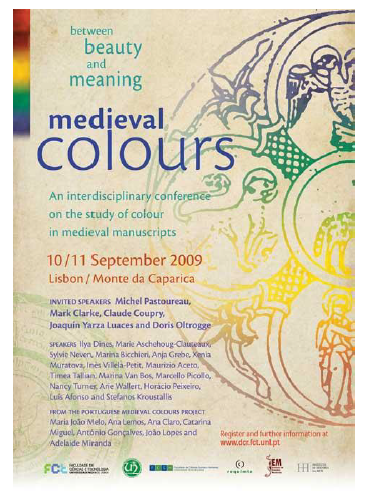Seminário “Medieval colours: between beauty and meaning”.
An interdisciplinary conference on the study of colour in medieval manuscripts, 10 a 12 de Setembro
Following the Portuguese Science Foundation projects in the study of color in Portuguese Medieval Manuscripts, the interdisciplinary team organized a conference in Lisbon on September 10-11 of this year, " Medieval colours: between beauty and meaning. An interdisciplinary conference on the study of colour in medieval manuscripts". For the first time it was possible to bring together the most eminent researchers in this discipline between the chemists, the art historians and conservation and restoration scientists. The invited speakers, Michel Pastoureau, Mark Clarke, Claude Coupry, Doris Oltrogge and Yarza Luaces put into context the state of art and methods in this field.
The opening discussions raised all the questions we are confronted with when studying the subject of color in medieval manuscripts. The facts presented by researchers of different geographic origins and institutions (universities, museums, chemistry laboratories) enabled a fruitful discussion of the different methods of research. It was concluded that there is knowledge to start the construction of an international database that would have as main objective the mapping of pigments. This achievement would constitute a very important step towards the understanding of the identity of pigments, which have been used in the manuscripts and their circulation.
According to all participants, this meeting was rewarding and the first of its kind, in which all the researchers had the opportunity to discuss all the projects in progress. We have stated the difficulties and the problems around this kind of approach, but it is important to mention that the Portuguese team (from the Department of Art History from FCSH and Department of Conservation and Restoration from FCT of New University of Lisbon) was the only interdisciplinary group working since 2006 in this field. All the results of this conference will be published throughout next year in a publication of the Department of Art History from the FCSH / UNL.















